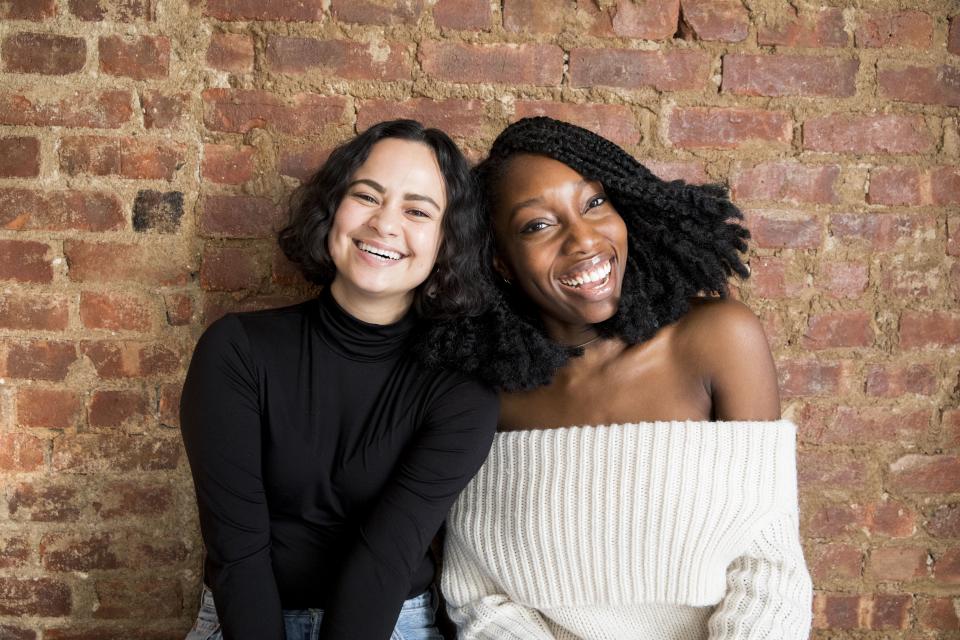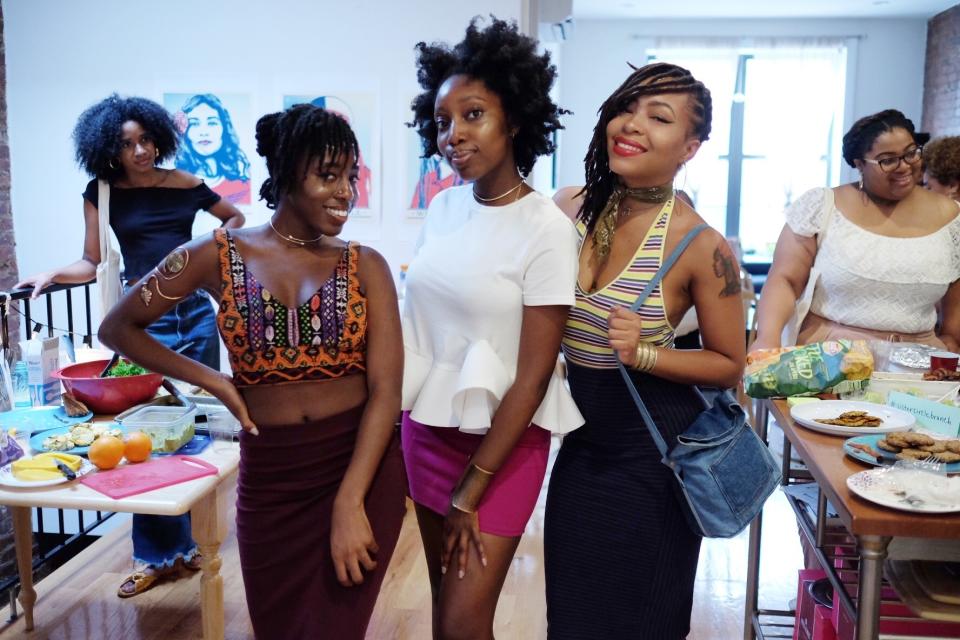How This Bimonthly Brunch Is Empowering Women and Non-Binary People of Color in the Trump Era
On a recent Sunday afternoon, a group of women gathered in a small Crown Heights apartment. The air smelled of coffee and fresh-baked scones, and upon every visible surface were platters of delicious food, drinks, and pastries, so crowded together that some threatened to fall off.
The women are gathered for an installment of Sister Circle Brunch (SCB), a new, Brooklyn-based community gathering open to women and femmes of color. The bimonthly brunch was born in March of 2017, and is the brainchild of two friends: Destiny Arturet and Alisha Acquaye.
Arturet and Acquaye met in 2015 while working at TED. Despite being from different backgrounds (Arturet is a biracial Latina and Acquaye is Ghanaian-American), the two became instant friends. Both reeling in the aftermath of the 2016 presidential election, they were desperate to find a way to bring their community together. While attending a local healing event for people of color, the pair were inspired to hold a similar event of their own. And, just a few weeks after Inauguration Day, they held their very first brunch.

Women and non-binary people of color meet at Sister Circle Brunch in Brooklyn, NY
Sara Haile“We hadn’t organized a brunch before [so] we just started brainstorming, set a date and invited all the women of color that we knew,” Arturet tells me, leaning into the black leather couch in her exposed-brick living room, the official gathering space of SCB. “I wasn’t even ready when the first guests arrived! I was in a robe,” Arturet admits, laughing. “We were so nervous.”
Despite the initial nerves, the two women quickly realized that the brunch event had the potential to become something greater than just an ad-hoc gathering. On the day of the first event — among the colorful foods and beverages brought by the attendees — the two noticed latent power gathering in the space they had created. “We realized how much we needed this and how much other women needed this,” Arturet explains. “That’s when I realized this can actually mean something.”
“Everybody really shows up, physically, emotionally, and mentally — and with really great food,” Acquaye adds. And, indeed, it’s impossible to discuss the SCB movement without mentioning food.

Women and non-binary people of color meet at Sister Circle Brunch in Brooklyn, NY
Chanel Matsunami GovreauCommunal meals have historically served as a glue, keeping communities of color together in the face of adversity and systemic oppression, and this event is no different. Acquaye and Arturet knew from the beginning that they wanted food to be at the crux of their gatherings, and their brunch-goers certainly had no complaints. “Spices tell stories, point blank. Food is culture, food is history,” Acquaye says. “Sharing a meal and taking food from the same bowl [is] an act of love and openness. Being able to cook and eat food with other people is nourishing.”
Everybody really shows up, physically, emotionally, and mentally — and
with really great food.
In keeping with the potluck precedent of the first event, brunch attendees bring food, often of cultural and historical significance. Recent guests have represented a vast spectrum of races, ethnicities, and lived experiences and the food they bring serves as a way to foster cross-cultural learning. “As people of color, we have stories and memories to share about our foods. It’s a way to teach others about where we came from,” Acquaye says.
“Our space feels like a family that we’ve chosen [where] we can speak candidly and honestly,” Acquaye explains, also noting that much of the event’s success is hinged upon the fact that it is a space reserved exclusively for people of color.

Women and non-binary people of color meet at Sister Circle Brunch in Brooklyn, NY
Sara Haile“No shade, but sometimes you have to hold your tongue with white people around,” Acquaye tells me. “There are times when you can’t say the things you really mean because there isn’t shared experience or empathy. We’ve spoken about microaggressions at work or within interracial friendships, and those are things you can’t easily speak about in other spaces.”
As people of color, we have stories and memories to share about our
foods. It’s a way to teach others about where we came from.
However, the pair notes that SCB discussions also highlight power dynamics and colorism at play within communities of color. “Even though we’re all people of color, we can also hurt each other,” Acquaye says. “Black people can hurt Asian people, Asian people can hurt Black people, Latinx people can hurt Black people — there are so many ways we can disturb each other with our words and stereotypes that are rooted within white supremacy.”
In an effort to begin to break down these heavy topics and inspire conversation, Acquaye and Arturet have chosen brunch themes based on seasons and holidays, such as “All About Our Mamas,” the event that was held near Mother’s Day. For this brunch, guests brought in photographs of their mothers or leading women in their lives to catalyze conversation about motherhood, matriarchy, misogyny, and intergenerational trauma.

Women and non-binary people of color meet at Sister Circle Brunch in Brooklyn, NY
Chanel Matsunami GovreauOther brunch themes have included “Passion and Purpose” for Labor Day and “Freedom” for the event that fell near Independence Day. But instead of adhering to traditional conceptualizations of these holidays, Acquaye and Arturet wanted to pivot and give their guests space to delve deeper. “We didn’t even talk about the Fourth of July at [the Freedom brunch], 'cause who cares about that holiday?” Acquaye laughs, adding, “We talked about our own personal freedom and liberation and how to achieve that.”
Regardless of the theme, the brunches include a combination of interactive exercises, craft-making, meditation workshops, and group discussion of diverse topics, including systemic racism, trauma, and gender roles in communities of color. Nearly a year after the inaugural brunch, it’s clear that the haven Acquaye and Arturet created has morphed into somewhat of a living organism. Recently, guests have started flocking to Brooklyn from across the five boroughs — and at times from as far as Philadelphia and Washington D.C. — to attend the event.

Women and non-binary people of color meet at Sister Circle Brunch in Brooklyn, NY
Chanel Matsunami GovreauAs such, Acquaye and Arturet are now in the process of developing brunch kits that will break down much of what they have learned in a year of hosting SCB events. By making these kits readily available, the pair hopes to empower other communities across the country and beyond to hold successful satellite brunches of their own. “We realize that there are a lot of people who hit us up from different states and express interest in coming to the brunch,” Acquaye tells me. In order to address what has proven to be a widespread need for this type of event, the women want to provide a blueprint for other people of color to create spaces for solidarity, healing, and brunching in their own cities and hometowns.
Being together, eating together — that’s joy. And
joy is resistance.
In a time of emboldened white supremacy and increased violence against communities of color, events like Sister Circle Brunch demonstrate that resistance can take many different forms beyond marching in the streets. After all, enjoying the pleasure of a home-cooked meal and empowering conversation in a space created by and for people of color is, in itself, an act of rebellion.
“This whole government is about bringing people down, women down, people of color down,” Acquaye says. “For us to come together and get stronger — that’s a way of resisting everything we have been taught about how to love ourselves and each other.”
“This really is so much bigger than we thought it could be,” Arturet adds, simultaneously slicing potatoes for that afternoon’s brunch. “Being together, eating together and enjoying life — that’s joy. And joy is resistance.”
Check out the Sister Circle Brunch on their website, or follow them on Instagram.
Read more about life under Trump:
Meet the Sexual Assault Survivors Who Attended Trump's State of the Union
10 Creators of Color Reveal What Makes Them Feel Most Beautiful
Now, destress with jade-rolling:


